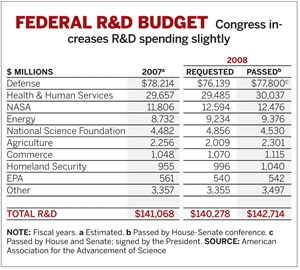Advertisement
Grab your lab coat. Let's get started
Welcome!
Welcome!
Create an account below to get 6 C&EN articles per month, receive newsletters and more - all free.
It seems this is your first time logging in online. Please enter the following information to continue.
As an ACS member you automatically get access to this site. All we need is few more details to create your reading experience.
Not you? Sign in with a different account.
Not you? Sign in with a different account.
ERROR 1
ERROR 1
ERROR 2
ERROR 2
ERROR 2
ERROR 2
ERROR 2
Password and Confirm password must match.
If you have an ACS member number, please enter it here so we can link this account to your membership. (optional)
ERROR 2
ACS values your privacy. By submitting your information, you are gaining access to C&EN and subscribing to our weekly newsletter. We use the information you provide to make your reading experience better, and we will never sell your data to third party members.
Policy
Small Growth In R&D Funds
Congress provides scant increases for physical sciences, biomedical research in 2008
by Susan R. Morrissey
December 24, 2007
| A version of this story appeared in
Volume 85, Issue 52
FEDERAL FUNDING of physical sciences and biomedical research will not keep pace with inflation under an omnibus appropriations bill passed by Congress last week. The bill provides support for every federal agency for 2008 except for the Department of Defense (DOD), which is the only agency to have its appropriations bill completed to date.
The measure, which at C&EN press time was expected to be signed by President George W. Bush before year's end, gives only a 3.1% boost to nondefense federal R&D funding. This growth falls short of the funding levels many Democrats had pushed for, but the bill meets the President's criteria for signing: It holds overall discretionary funding to his requested amount of $738 billion (this includes $460 billion appropriated to DOD), and it provides requested funding for the war in Iraq.
"Within the limits set by the President, we have funded as best we could essential priorities of this nation," says Senate Appropriations Committee Chairman Robert C. Byrd (D-W.Va.). House Appropriations Committee Chairman David Obey (D-Wis.) calls the omnibus bill "totally inadequate" but adds that "it is a whole lot better than the country would have without a Democratic Congress."
Although the bill boosts projects related to energy, conservation, and the environment, it is not so kind to basic physical sciences and biomedical research. Specifically, the bill provides only a 1.1% increase for R&D at NSF and a 0.9% increase for R&D at NIH.
This below-inflation growth at NSF and NIH is not good news for individual researchers. "The declining grant success rates that agencies like NSF and NIH are experiencing will not turn around with these appropriations," says Kei Koizumi, director of the R&D Budget & Policy Program for the American Association for the Advancement of Science.
The omnibus bill is also not kind to agencies associated with the America Competes Act, namely NSF, the National Institute of Standards & Technology, and the Department of Energy's Office of Science. Under this act, these three agencies have been targeted for a decade-long budget doubling, but the 2008 appropriations bill derails such growth.
Other programs that may not be able to remain on track are NASA's lunar mission and its Earth-observing satellites program. Also, the omnibus bill provides zero funding for the DOE's fusion-energy International Thermonuclear Experimental Reactor, for which the Administration had requested $160 million.
Funding for DOE's Office of Science, for which the budget remains essentially flat, is complicated by the return of congressionally mandated projects, or earmarks. Earmarks were not a factor in 2007 because DOE was funded under a yearlong continuing resolution. The omnibus bill for 2008, however, includes $124 million in earmarks for the Office of Science.
The omnibus bill also includes a provision by Sen. Frank Lautenberg (D-N.J.) to allow states to impose stricter chemical facility security regulations than those recently issued by the federal government.
Although the budget increases set in the omnibus bill are modest, Koizumi points out that in light of the hold on domestic spending, "nondefense R&D programs are doing about as well as you can expect."




Join the conversation
Contact the reporter
Submit a Letter to the Editor for publication
Engage with us on Twitter